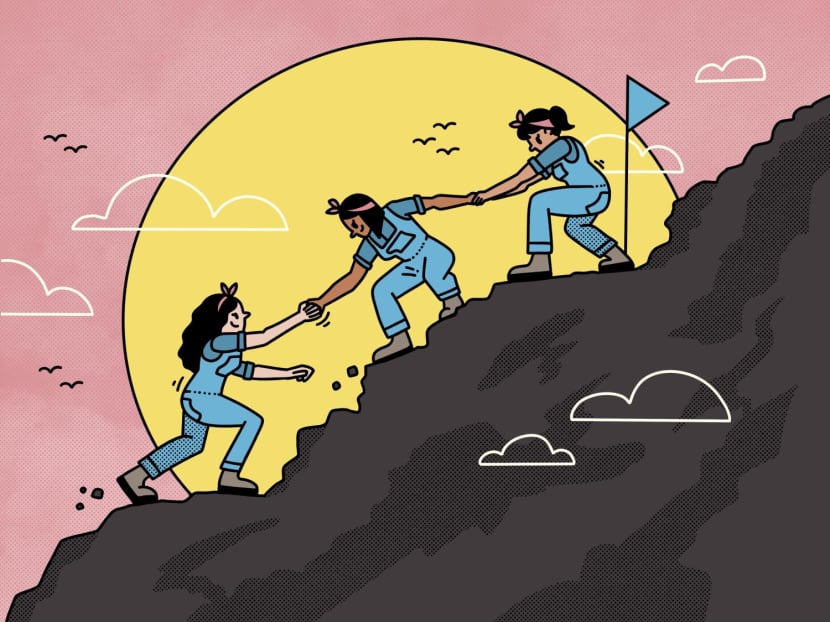Gen Y Speaks: A panic attack taught me I can still be an 'independent feminist' even if I slow down and seek help
If you told 20-year-old me that I would someday take a 75 per cent pay cut and leave my decade-long career to become a childless homemaker, I’d have told you that you weren’t being very Feminist.


This audio is AI-generated.
If you told 20-year-old me that I would someday take a 75 per cent pay cut and leave my decade-long career to become a childless homemaker, I’d have told you that you weren’t being very Feminist.
Growing up, I was always taught that as a girl, I was “so lucky” to be able to have an education. We “need to” have a career so that we never have to rely on a man (in case he leaves you). We “have to” succeed at work while concurrently running an immaculate household, all while raising offspring and staying in shape (so that he wouldn’t leave you).
On top of all that, close your legs when you sit! Wear shorts under your skirt! Don’t run around! Don’t talk back! Don’t ask so many questions.
So, at 19, I took on my first full-time job in advertising while doing my degree part-time.
For nearly three years, I worked through the day, went to school from 7-10pm, continued working until 3am, napped until 7am, woke up, hit the gym before going to work and repeating the cycle.
I missed many family events, worked over many weekends, and proudly posted pictures on social media of me working on the office balcony with cringe-worthy captions like “Sunday things”.
At 22, I moved out of my parents’ place so I could be independent.
At 24, I worked in Shanghai for a few months (so fancy).
At 25, I was earning a lot more than most of my peers who were just starting out. Having just got out of an abusive relationship, I’d also decided I was never going to get married.
At 28, I hit my personal goal of becoming a senior planner before turning 30, earning over six figures annually — and I got engaged!
Damn, was I crushing it at life or what.
Joke’s on me — after nearly a decade of wearing the “Hardworking Feminist” badge so proudly, I developed a severe case of anxiety.
FROM BREAKDOWN TO TAKING A BREAK
In 2019, my fiancé Josh and I had recently moved into our resale flat that we could barely afford.
I had just picked up a Muji bench we’d bought secondhand off Carousell, and in the lift up to our floor, I started feeling the onset of a panic attack. There were only two other people in the lift, but their quiet chatter felt suffocating.
The second the lift doors opened, I sprinted through them and down the corridor, let myself in with shaking hands and laid on the living room floor, hyperventilating.
The hum of the ceiling fan was unbearable. There was nowhere quiet enough for me.
I tried to melt into the floor. I wanted to just dissipate.
I called Josh, but I could barely manage words. He was overseas for a work trip, and had never dealt with a panic attack before. Bless his heart for enduring my loud, shallow breathing and whimpering while telling him to just shut up with grace and patience.
I didn’t understand — why was I freaking out?
At 28, I “had it all”. I had the job title I’d aimed for and worked towards for years. I commanded a salary that made my parents proud. I was about to marry an absolute stud, and we had our own cosy little home.
I had it all, exactly the way everyone had talked about all throughout my youth. I even had house plants!
My partner encouraged me to quit not just my job, but the whole industry. He also gently suggested I see a therapist — which I scoffed at, because I was an Independent Feminist, and I didn’t need help, and I needed my career.
He also said that I could take time off work and take a sabbatical.
“Do you know how crazy that sounds in this economy?” I ranted. “What if no one hires me again? What if I never earn the same?”
On the inside, I was scared and rattled: What if he leaves me? I got angry at myself for being “weak” and “soft”.

‘THAT SHOULD BE ME’ — OR SHOULD IT?
At work, I saw many gorgeous women “do it all”.
They’d come into the office early after a workout, shower and paint their faces on. They held important roles, spoke clearly and confidently in meetings, and had a seat at the table. The sound of their heels clicking on the wooden floors was a ticking testament to their assured assertiveness.
They took 9pm calls after putting their kids to bed. “Sorry, I’m two minutes late, it was so hard to get her to sleep tonight. Kids, right?” Polite laughter all around.
That was meant to be me.
After the panic attack, I didn’t know what I wanted out of life anymore. What I did know was this: I didn’t want to be constantly anxious, and my current lifestyle wasn’t sustainable for me or my partner.
So, I did it. For me, for us, I quit my job. I quit the whole industry.
I used to earn more than my husband, now he earns more than I do. I used to spend my days (and most nights) buried in work, only coming home to complain about work or getting black-out drunk to forget how much I hated my life.
I decided to become a childless homemaker, depending on my husband to be the main breadwinner, while his bread paid for my therapy sessions.
In therapy I learnt the single most important thing no one had ever told me before: There is no “should”. You get to choose the life you want; you get to set your own boundaries.
I also learnt that for me, perfectionism and being “Type A” weren’t “born traits” as I’d always thought — rather, they were defence mechanisms.
It took some time and a lot of uncomfortable self-reflection, but eventually I also learnt that true feminism isn’t about having it all, all the time. Instead, it is a balancing act.
Being an independent woman isn’t doing everything on your own. There is nothing wrong with relying on your sisterhood and on your chosen “village” — in fact, doing so can be empowering, to make life work for all of us.
Being a strong woman isn’t about putting up walls so that you never get hurt, but about setting boundaries so others know how to treat you.

A LIFE BEYOND IDEALS
Since I quit my “feminist” career, I’ve been spending my time taking care of the home and our dog.
I’ve started a small clothing business, held a pop-up market, became a boxing coach, started a weekly all-girls futsal game, picked up random freelance gigs like designing PowerPoint presentations or consulting on projects, helped lead beach clean-ups with Stridy, and started a podcast.
I now work for a martial arts gym, devote a chunk of my time to raising funds for charities and causes I believe in, and have recently embarked on a quest to write a book.
In between all of that, I’ll get a random text from a friend saying, “You free to hang out today?” Next thing I know, we’re at the beach picking seashells and enjoying the gentle waves on S$13 Decathlon floats, or we’re painting at her house, unskilled but unconstrained.
I no longer own a blazer, underwired bra, or a single pair of high heels.
Honestly, my younger self — still wrapped up in the chains of expectations and imposed aspirations — would look at me now and think, “Wow, what a failure”.
She would be wrong though. Instead of striving to earn the right to live my best life, I’m finally living it.
ABOUT THE AUTHOR:
Grace Ke, 32, is a boxing coach at Neue Fit and the founder of mental health podcast Naked.Graced.








